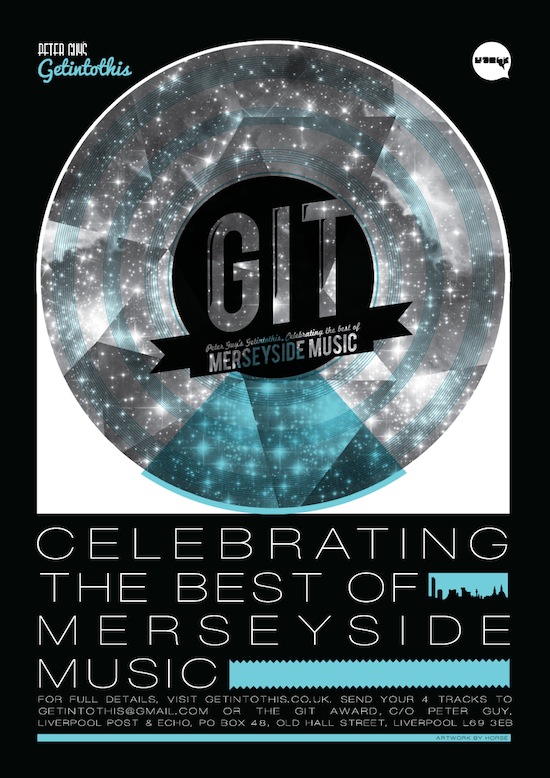The Beatles were both a blessing and a curse for Liverpool. They gifted the place a permanent tourist income and a truckload of civic pride, but also cast a very long shadow that the city’s musical and artistic community have struggled to emerge from ever since. Despite a near-constant stream of great musicians emerging from the city over the past thirty years, from A Flock of Seagulls to Zombina and the Skeletones, Atomic Kitten to The Zutons, Liverpool has struggled to eradicate its image as a heritage attraction themed around The Fab Four.
Over the past few years, events such as Sound City (the annual music festival and conference that takes place across the city each May), the Biennial art festival and the city’s hosting of the MOBO awards in 2010 and 2012 have shown the rest of the UK that Liverpool music isn’t all cheesy-grinned covers bands, Scouse House and buskers belting out Eleanor Rigby.
The GIT (Getintothis) awards have been instrumental in this Scouse musical renaissance. The brainchild of music journalist, Peter Guy, born out of the blog of the same name he’s been writing for the Liverpool Echo since 2007, they are a celebration of the best new Merseyside music. Now in its second year, ‘the Scouse Mercury Prize’ features a diverse shortlist (have a look at our preview here) of 12 established – and not so established – artists, from indie darling Dan Croll (who has been featured in Time Magazine and recently performed at South by South West) to fifteen-year-old rapper Tyler Mensah, currently in his final year of high school. The awards are a great way for innovative and original musicians currently recording and gigging in Liverpool to show themselves off to a wider audience who may not have been aware of their existence.
Guy’s commitment to bringing the music of the city to a wider audience is infectious and he’s undoubtedly got a great roster of judges lined up, including Matt Wilkinson, NME‘s new music editor, BBC 6 Music DJ Tom Ravenscroft, Andrew Harrison, former editor of Q Magazine, as well as our very own John Doran. The prizes aren’t too shabby either, with the winner collecting a snazzy trophy and £1000 in prize money on the night, as well the opportunity to play at the Yoko Ono-curated Meltdown festival at London’s South Bank centre in June. A special Innovation Award, recognising services to Liverpool’s music industry, will also be presented.
With the showcase evening just around the corner, we sat down with Peter Guy to discuss the GIT Awards, the nominated artists and why Liverpool is currently producing some of the “finest creative talent in the world”.
Why does Liverpool need something like the GIT Awards?
Peter Guy: Well, personally speaking, I think it’s the best city in the world for new music. I know that sounds like a bit of a bland statement but you only have to look at the shortlist from the past two years to see how much of a diverse range of music there is. I think there’s a lot of stuff that goes missed, which is why I founded the awards – to get all of those buried treasures and put them out there on a bigger scale.
It does seem to be quite an eclectic shortlist, so do you think that this represents the best of the current Liverpool music scene?
PG: I think there are acts and artists who could have made the shortlist who aren’t on there but I’ve said it before, I genuinely think the way Liverpool is going, we could have had about 40 acts on there and it wouldn’t have diluted the shortlist at all. However, I am really chuffed with what the judges have come up with. I think it’s a really strong list and no one seems tokenistic. Everyone on there has produced quality music within the past few months and there are a few people who really are opening people’s ears who maybe would have been missed before.
LIPA (The Liverpool Institute for Performing Arts) bands are so dominant within the Liverpool music scene; do you think sometimes that the artists and bands coming out of there have undue influence upon the musical life of the city?
PG: Not really. I think that LIPA’s a strange one – three or four years ago, the LIPA tag was still almost a mark – it was met with derision I would say. However, there’s now a new breed of artists coming out of LIPA – your Dan Crolls, your Joe Wills [a local producer who is a graduate of LIPA’s BA Sound Technology course], Rebecca Hawley from Stealing Sheep, some of the other people who are not necessarily music makers but are involved in the mechanics of music from Liverpool, have really integrated themselves with homegrown talent and have bridged the gap and made the music and artists coming out of LIPA more of an integral part of Liverpool life.
They’ve changed people’s perceptions of the music emerging from the city, and of them, and LIPA bands – now the vast majority of people who know their music within Liverpool don’t meet that sort of thing with negativity any more. I’d say that there’s just one clean community of everyone pushing in the right direction. People who are quick to go, “aww, it’s a LIPA band” or whatever – they’ll find criticism in virtually anything these days. They’re quick to judge, they’re quick to be negative and to whip anything and try to knock anything down and I’d say that that’s more of a problem with themselves rather than Liverpool music as a whole really. That attitude can just be a bit unhealthy. I’m all for constructive criticism and everyone having their own opinion – I’m very much of that mindset myself – but I think sometimes people unnecessarily poke holes in things just for the sake of it.
What do you think makes Liverpudlian bands and artists so unique and so different from the music emerging from other northern cities?
PG: I wouldn’t say its best to speak of individual cities but I think what makes Liverpool unique right now is the collaborative spirit. I think that if you look at last year’s GIT Awards, the vast majority didn’t even move in the same circles. I don’t think that there is one scene in Liverpool, yet of those twelve artists, seven ended up collaborating. For example, Esco Williams has been doing his thing for ten years in Liverpool, but the profile he gained after last year’s GIT Awards was unbelievable. MOBO created an award especially for him, the ‘Unsung’, which is basically the unsigned award and Esco also ended up collaborating with other artists on the list. And then you had Miss Stylie, a Toxteth rapper who used to play football for Liverpool Ladies FC, who ended up collaborating with the Tea Street Band. You had other artists on the list who, up until that point, might not have considered collaborating with those artists on there, and yet because of the spirit that’s within Liverpool, they ended up melding together.
So it’s a good way for new artists to discover what else is going on in the city?
PG: Yeah, definitely!
Because there’s a risk sometimes that if you’re just a guitar band, you operate in that small circle of guitar bands, and if you’re a rapper you operate in that circle. So it’s a good way for different worlds to collide under one umbrella.
PG: Yeah definitely, and I don’t think that’s exclusively a GIT Awards thing. I think that’s just Liverpool in general. I was very lucky when I started the blog in 2007 that the Kazimier was just starting, Sound City was just gaining momentum in its second year and quite a few of the cornerstones of the Liverpool art scene really kicked off. There was a huge cultural renaissance after the Capital Of Culture [in 2008]. I think the independent scene really saw what was going on in the commercial sector and just got a bit of a kick up the arse really. They could see what was going on and they decided to have a mini revolution themselves. A lot of pockets of Liverpool music and Liverpool art started joining up together, so you had bloggers working with designers and people within studios all started collaborating with different artists and sound technicians ended up producing a lot of different bands, so there was a whole interplay within the cultural sector.
Liverpool does seem to be having a bit of a renaissance in terms of gig venues – you’ve got places like The Blade Factory, The Kazimier (who won the GIT Awards’ Innovation Award in 2012) the newly opened East Village Arts Club…
PG: It’s strange because 18 months ago, there was this false perception that Liverpool venues were shutting down. I mean, The Masque was a great loss, but it’s only been out of the game for six months and then there were smaller places like Static Gallery and the Wolfenstone Creative Space as well. However, I think that there are a number of superb venues in Liverpool. It’s a city that really punches above its weight in terms of its size.
There’s a really good age range within the nominees. I mean, you’ve got artists like Clinic who have been doing their thing for years and years, as well as quite a few younger artists. It’s a nice split of the music currently being created within the city.
PG: I mean, that’s the beauty of the award. It’s open to literally anyone, from your bedroom musicians in Huyton to Paul McCartney. I’d never heard of Tyler Mensah before this process, but for this fifteen-year-old to pop up out of nowhere – he’s got amazing charisma, superb songs and such a real maturity. I’ve spoken to him a couple of times now and he’s a great talent, really someone to watch for the future.
Then, as you say, the older more established artists, such as Clinic, Wave Machines, they’ve been doing the rounds for a while. And there are a lot of artists who have been leading their fields, but not necessarily picked up in Liverpool too much. You’ve got people such as John Heckle who are really established within dance production circles in Europe and yet barely known within Liverpool and not really perceived as being major artists. It’s the same with Conan, they’re really well regarded within the metal circle, but in Liverpool, it’s: “Conan, who are they?”
So, in some ways, it’s really introducing Liverpool to what they’ve got?
PG: Definitely! Conan said that they had to leave the city to get recognition and then come back, so when they were nominated they were absolutely delighted. Same with all of the artists – there were a few who were absolutely blown away to be on there. Another was Barberos – a lot of people were like, “woah, their music is just so far out there. Three guys clad in silver lycra bodysuits just going absolutely insane!” I mean, what a band! Although, to be honest, any of the twelve artists stand an equal chance and I’ll be chuffed with whoever it is. I know that’s really sitting on the fence but I think that they’re all great, great artists in their own right. They’re all boss.



